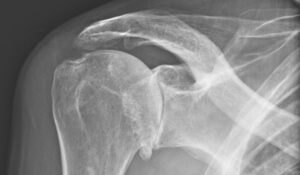In orthopedics, patient-centered care has gained significant attention in recent years. One crucial aspect of patient-centered care is the use of Patient-Reported Outcomes (PROs) to assess the impact of a medical condition or treatment as it’s conveyed by the patient. When it comes to shoulder care, PROs play a vital role in enhancing treatment decisions, monitoring progress, and improving overall patient satisfaction. This blog post aims to explore the importance of PROs in shoulder care and how they contribute to better patient outcomes.
Capturing Patient Perspectives
Shoulder conditions can vary greatly in their impact on patients’ lives, ranging from mild discomfort to severe pain and functional limitations. PROs allow shoulder specialists to capture patients’ conditions and recovery and accurately evaluate the effectiveness of interventions. By collecting information directly from patients through validated questionnaires, clinicians like Dr. Hatz gain insights into pain levels, functional limitations, and quality of life associated with shoulder conditions.
Monitoring Treatment Progress
Tracking patient progress is essential to evaluate the effectiveness of interventions and make necessary adjustments. PROs offer a reliable and patient-centered approach to monitoring treatment outcomes over time. Regular PRO assessments enable healthcare providers to detect changes in pain, function, and quality of life, allowing them to tailor treatment plans accordingly. Objective measurements, such as range of motion or radiographic findings, might not fully capture the patient’s experience, making PROs an indispensable tool for comprehensive evaluation over the course of years and, in Dr. Hatzidakis’s case, decades.
Comparative Effectiveness Research
In the realm of shoulder care, PROs contribute to comparative effectiveness research, allowing clinicians and researchers to compare different treatment approaches and determine which interventions lead to better patient outcomes. By analyzing PRO data across various interventions, Dr. Hatzidakis has been able to identify best practices, improve treatment guidelines, optimize the overall quality of care, and lead to innovating technologies and treatments to advance the care of shoulders worldwide.
Enhancing Patient Satisfaction and Quality of Life
The primary goal of shoulder care is to improve patients’ quality of life and overall well-being. PROs help healthcare providers like Dr. Hatzidakis understand the impact of treatments on patients’ functional abilities, pain levels, and psychological health. By actively involving patients in their care, addressing their concerns, and monitoring their progress through PRO assessments, healthcare professionals can tailor interventions to maximize patient satisfaction and quality of life outcomes.
Conclusion
Patient-Reported Outcomes are invaluable in shoulder care, as they provide a comprehensive understanding of the patient’s experience and enable personalized, patient-centered care. By capturing patient perspectives, monitoring treatment progress, supporting comparative effectiveness research, and enhancing patient satisfaction, PROs play a pivotal role in improving shoulder care outcomes. Embracing PROs as a key component to his practice the past two decades, Dr. Hatzidakis has discovered more effective treatments, improved patient satisfaction, and ultimately, improved patient well-being.




